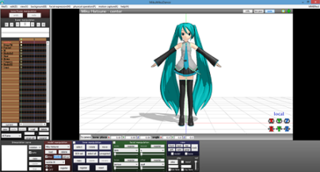
In computers, case sensitivity defines whether uppercase and lowercase letters are treated as distinct (case-sensitive) or equivalent (case-insensitive). For instance, when users interested in learning about dogs search an e-book, "dog" and "Dog" are of the same significance to them. Thus, they request a case-insensitive search. But when they search an online encyclopedia for information about the United Nations, for example, or something with no ambiguity regarding capitalization and ambiguity between two or more terms cut down by capitalization, they may prefer a case-sensitive search.
In computing, tar is a computer software utility for collecting many files into one archive file, often referred to as a tarball, for distribution or backup purposes. The name is derived from "tape archive", as it was originally developed to write data to sequential I/O devices with no file system of their own, such as devices that use magnetic tape. The archive data sets created by tar contain various file system parameters, such as name, timestamps, ownership, file-access permissions, and directory organization. POSIX abandoned tar in favor of pax, yet tar sees continued widespread use.

Clean is a general-purpose purely functional programming language. Originally called the Concurrent Clean System or the Clean System, it has been developed by a group of researchers from the Radboud University in Nijmegen since 1987. Although development of the language has slowed, some researchers are still working in the language. In 2018, a spin-off company was founded that uses Clean.
In computing, a command is a directive to a computer program to perform a specific task. It may be issued via a command-line interface or as input to a network service as part of a network protocol, or as an event triggered in a graphical user interface.

.nfo is a filename extension for text files that accompany warez scene releases of pirated software or media.

In software distribution and software development, a README file contains information about the other files in a directory or archive of computer software. A form of documentation, it is usually a simple plain text file called README, Read Me, READ.ME, README.txt, or README.md

In file systems, case preservation is the preservation of the letter case of letters in file names. If an attempt is made to create a file named "ThisIsAFile" on a file system that preserves letter case, the file's name will be "ThisIsAFile", rather than, for example, "thisisafile" or "THISISAFILE".
FAAC is a software project which includes the AAC encoder FAAC and decoder FAAD2. It supports MPEG-2 AAC as well as MPEG-4 AAC. It supports several MPEG-4 Audio object types, file formats, multichannel and gapless encoding/decoding and MP4 metadata tags. The encoder and decoder is compatible with standard-compliant audio applications using one or more of these object types and facilities. It also supports Digital Radio Mondiale.

Poppler is a free and open-source software library for rendering Portable Document Format (PDF) documents. Its development is supported by freedesktop.org. Commonly used on Linux systems, it powers the PDF viewers of the GNOME and KDE desktop environments.

The table below is a brief chronology of computed numerical values of, or bounds on, the mathematical constant pi. For more detailed explanations for some of these calculations, see Approximations of π.
MCC Interim Linux is a Linux distribution first released in February 1992 by Owen Le Blanc of the Manchester Computing Centre (MCC), part of the University of Manchester. It was the first Linux distribution created for computer users who were not Unix experts and featured a menu-driven installer that installed both the kernel and a set of end-user and programming tools.

Gpg4win is an email and file encryption package for most versions of Microsoft Windows and Microsoft Outlook, which utilises the GnuPG framework for symmetric and public-key cryptography, such as data encryption, digital signatures, hash calculations etc.

SMPlayer is a cross-platform graphical front-end for MPlayer and mpv and forks of Mplayer using GUI widgets offered by Qt. SMPlayer is free and open-source software subject to the terms of the GNU General Public License version 2 or later. SMplayer has been localized in more than 30 languages.

MikuMikuDance is a freeware animation program that lets users animate and create computer-animated films, originally produced for the Japanese Vocaloid voice synthesizer software voicebank Hatsune Miku, the first member of the Character Vocal series created by Crypton Future Media. The program itself was programmed by Yu Higuchi (HiguchiM) and has gone through significant upgrades since its creation. Its production was made as part of the VOCALOID Promotion Video Project (VPVP).
IRC It, or ii is a free and open-source Unix IRC client written in C by the suckless.org community.
lmctfy is an implementation of an operating system–level virtualization, which is based on the Linux kernel's cgroups functionality.

KeRanger is a ransomware trojan horse targeting computers running macOS. Discovered on March 4, 2016, by Palo Alto Networks, it affected more than 7,000 Mac users.

GNOME SoundConverter is an unofficial GNOME-based free and open-source transcoder for digital audio files. It uses GStreamer for input and output files. It has multi threaded design and can also extract the audio from video files.
AV1 Image File Format (AVIF) is an open, royalty-free image file format specification for storing images or image sequences compressed with AV1 in the HEIF container format. It competes with HEIC, which uses the same container format built upon ISOBMFF, but HEVC for compression. Version 1.0.0 of the AVIF specification was finalized in February 2019.









